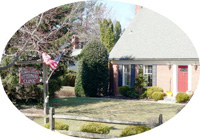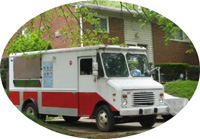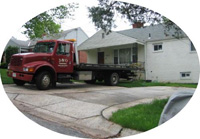
Preserving the quality of life in Montgomery County neighborhoods needs help from all of us. New County laws initiated by the County Executive and approved by the County Council are designed to help protect our residential neighborhoods. These laws go into effect April 24, 2011. In general, what follows is what you need to know. For exact details see the legislation or call 311.
Home-Based Businesses | Parking for Heavy Commercial and Recreational Vehicles | Parking Off-Street | Paving Front Yards | How Are These Laws Enforced? | Contact Us

Home-Based Businesses
County residents can operate businesses out of their homes– subject to certain restrictions.
There are three types of home-based businesses allowed:no-impact(which don't need to register with the county), registered (which need a permit from the Department of Permitting Services), and medical practitioners(must also register.) The person who performs the occupation must live in the house. On-site employees are limited to one in a 24-hour period. The number of visits to a no-impact business is limited to five customers/clients a week. A registered business is allowed no more than five customers/clients a day or 20 a week.
The on-site parking for home occupations is limited to two spaces. Lawn maintenance companies operating as home occupations are allowed only one single-axle trailer or truck at a time.
Parking for Heavy Commercial and Recreational Vehicles
Heavy commercial vehicles and recreational vehicles are prohibited from parking on residential streets, except temporary parking for loading and unloading.Heavy commercial vehicles are defined as follows: a gross vehicle weight of more than 10,000 pounds; a manufacturer's rated capacity of more than one ton; more than 21 feet long (including any object loaded onto the vehicle); or are more than eight feet high (including racks, but not antennas). These vehicles are prohibited from parking off-street in residential neighborhoods.
Recreational vehicles include motor homes and trailers, including those used to transport other leisure equipment.One recreational vehicle per household can be parked off-street on available surfaced area in residential neighborhoods.
 Parking Off-Street
Parking Off-Street
Vehicles parked in front yards must be on surfaced areas. There is an off-street parking limit of one light commercial vehicle. Inoperable or unregistered vehicles are not allowed anywhere on the property.
 Paving Front Yards
Paving Front Yards
In R-200, R-150 and R-90 residential zones, County residents can pave no more than 30 percent of their front yards or 320 square feet — whichever is greater. In R-40 and R-60 residential zones, the limit is 35 percent of their front yard or 320 feet, whichever is greater. On major streets, the limit is 50 percent — or 320 square feet. No more than one vehicle may be parked for every 160 square feet of paved surface. Any surfaced area paved before October 26, 2010 does not have to be removed if the paved area is not increased.
However, the occupants must comply with the new law's parking limitations effective October 24, 2011.
How Are These Laws Enforced?
Enforcement is primarily by complaint.Home occupations, the paving of front yards and off-street parking issues are the responsibility of the Department of Permitting Services. Unregistered and inoperable vehicle issues are handled by the Department of Housing and Community Affairs. On-street parking complaints fall to the Police Department.Typically, for Permitting Services and Housing & Community Affairs, an inspector investigates the complaint and issues a Notice of Violation if he or she finds just cause. If the violation is not corrected and/or dismissed within 30 days, a citation may be issued accompanied by a $500 fine. On-street parking violators can be ticketed by the Police.
Contact Us
If you have questions please call the Customer Service Center at 311 (when calling from within the County) or 240-777-0311 (when calling from outside the County).
Working together, we can maintain the residential character of our neighborhoods.
